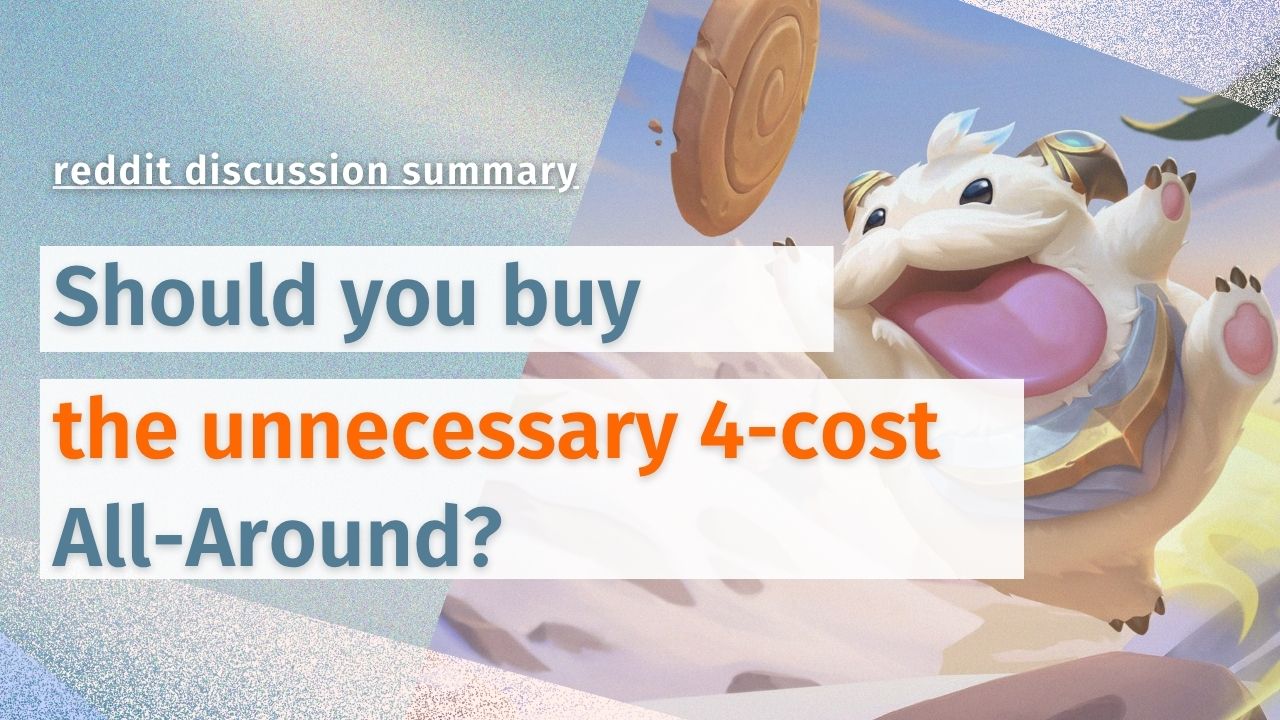article
summary
This article was posted on Reddit “r/CompetitiveTFT” titled ” Should I temporarily buy an unnecessary 4-cost in order to subtract the desired 4-cost? ” This is a summary of the discussion “Should I temporarily buy unnecessary 4-costs in order to draw the desired 4-costs?
Many of the top players share their real-life experiences and theories, and the discussion delves deeply into decision making and risk/efficiency when rerolling.
Contents

The genesis of this thread was “Is it actually efficient to compress the pool by temporarily purchasing other unwanted 4-costs (e.g., Aphelios, etc.) when you are rolling for a desired 4-cost unit (e.g., Cho=Gas)?” The question was.
Many users on Reddit , including highly ranked players, engaged in a lively exchange of opinions on this question based on actual experience, theory, and feeling.
Positive Arguments (Should be done)
- If you are confident in your operation, then yes.
- For example, in a situation where Exotech is competing with two or more players, it is worthwhile to temporarily have a Zeli or Sejuani to also interfere with other players.
- Stabilize the board by picking up units that could be replacements
- Effective in situations where you can reroll slowly.
- Worth running during rerolls when you have 50G or more, or when you have a spare bench.
- Flexibility to temporarily employ an alternate carry is important, assuming the unit you are looking for cannot be drawn.
Arguments of the denialists (those who prefer not to do it)
- Theoretically correct, but risky in the real world.
- Most high level players don’t recommend this.
Especially in rounds where you are going all-in, you lose a lot of HP for nothing due to lack of time. - Accidents occur frequently, such as accidentally selling a unit that is really needed, or filling up the bench.
- Most high level players don’t recommend this.
- The increase in probability is slight.
- The difference in probability is at the margin of error when viewed in the simulator. You should do it the way you are comfortable moving.
- If you have time to buy another unit, it’s more stable to roll twice more.
- The ability to make decisions other than rolls should be a priority.
- It is much more important to know “which configuration to move to” and “which pieces to receive” than APM (operation speed).
It is more promising to improve your playing than to stick to this optimization.
- It is much more important to know “which configuration to move to” and “which pieces to receive” than APM (operation speed).
(e.g. news) roundup
In response to this discussion, a person named Qualdrion has summarized the theoretical conclusions:
Assuming you are targeting a specific 4-cost unit like Cho-Gas in Stage 4-2 and the other players hold a total of 35 other 4-cost units, there are 9 target units left.
Of the 130 4-cost units, 35 are eliminated from the pool, leaving 9 units you are looking for.
This slightly increases the probability of a 4-cost unit in the store from 9/95 to 9/93 if you retain the two unwanted 4-cost units.
In fact, the expected value per reroll increases from about 0.1658 to 0.1694 (+ about 2%), with an estimated value increase of 1 to 2 G’s for every 50 G’s worth of rerolls.Factoring in the purchase of the unit, the gain from this play is worth about 0.5 to 1 gold for a 50G reroll.
On the other hand, the HP and tempo lost due to mistakes and late operations are far heavier.
Unless you are a very confident player, or you are rerolling slowly at 50G, the “risk is likely to outweigh the return”.
Thus, although theoretically effective, the common view of most high-ranked players was that the risk of accidents due to wasted operation time and delay in board construction was greater than the minute increase in expected value in actual play.
Particularly in the all-in in Stage 4, there were cases where a one-second delay in decision-making led to a loss of 12 to 15 HP, and there were many who said that the original objective (making a strong board) should not be sacrificed for the sake of optimization.
After all,
” If you can do it, do it, but basically, don’t do it.
” The returns are far greater with careful board construction and accurate transition decisions.
This is the practical conclusion of this discussion.
impression
This discussion was truly symbolic of the ” gap between theory and actual practice ” and was a great learning experience for intermediate to advanced TFT students!
I have had many experiences in the past where I did “just in case…” and had accidents with bench lock, but after reading the viewpoints of the top players, I am convinced.
There are many situations where you can do something if you can, but you can be stronger if you don’t….
This is a good thread to learn the “right way of thinking” in situations where you are lost in TFT!
Citation: Competitive TFT

Thank you so much, theoretical TFT player!





コメント